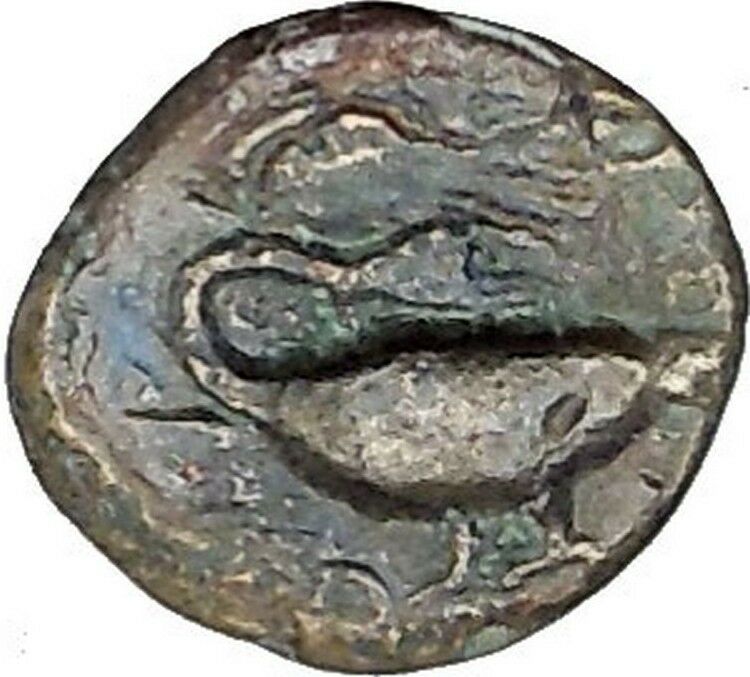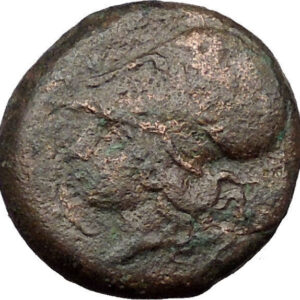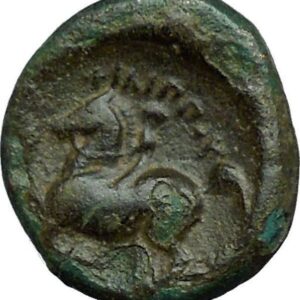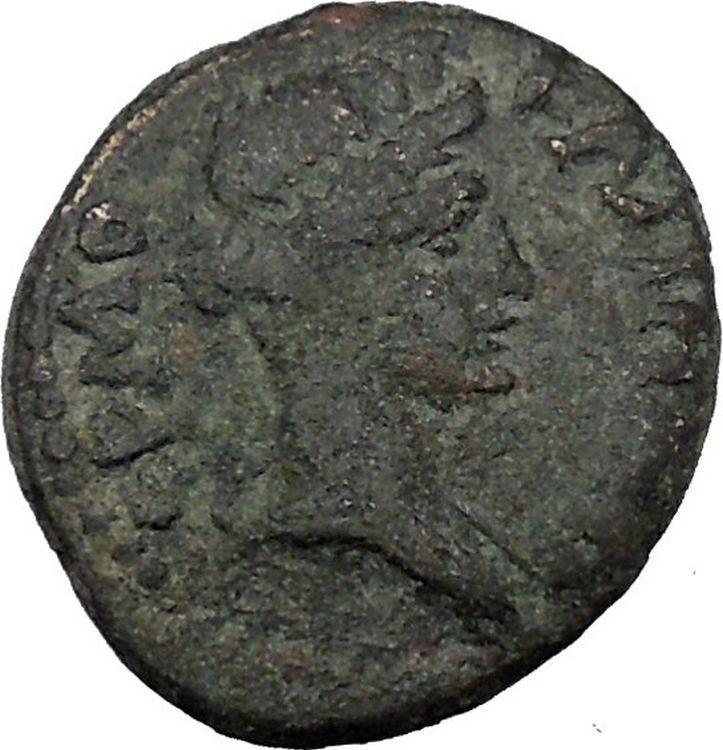|
Seleukid Empire
Antiochos III, Megas – King: 222-187 B.C.
Bronze 14mm (3.30 grams) Sardeis mint: 222-187 B.C.
Reference: HGC 9, 518 Rare R1-R2; SC 983
Laureate head of Apollo right.
ΒΑΣΙΛΕΩΣ / ANTIOXOY either side of Apollo standing left, holding arrow held in right hand, left elbow resting on tall tripod; monograms in field to left and right.
Antiochos III, Megas (‘The Great’) (B.C. 222-187), second son of Seleukos II Kallinikos , succeeded to the throne on the death of his brother Seleukos III Keraunos, when he was only in his 15th year. After defeating (220) Molon, satrap of Media, and his brother Alexander, satrap of Persis, who had attempted to make themselves independent, he carried on war against Ptolemy Philopator, king of Egypt, in order to obtain Coele-Seleukia, Phoenicia, and Palestine, but was obliged to cede these provinces to Ptolemy, in consequence of his defeat at the battle of Raphia near Gaza, in 217. He next marched against Achaios, who had revolted in Asia Minor, and whom he put to death, when he fell into his hands in 214. Shortly after this he was engaged for 7 years (212-205) in an attempt to regain the E. provinces of Asia, which had revolted during the reign of Antiochos II Theos ; but though he met with great success, he found it hopeless to effect the subjugation of the Parthian and Baktrian kingdoms, and accordingly concluded a peace with them. In 205 he renewed his war against Egypt with more success, and in 198 conquered Palestine and Coele-Seleukia, which he afterwards gave as a dowry with his daughter Cleopatra upon her marriage with Ptolemy Epiphanes. In 196 he crossed over into Europe, and took possession of the Thracian Chersonese. This brought him into contact with the Romans, who commanded him to restore the Chersonese to the Macedonian king ; but he refused to comply with their demand ; in which resolution he was strengthened by Hannibal, who arrived at his court in 195. Hannibal urged him to invade Italy without loss of time ; but Antiochos did not follow his advice, and it was not till 192, that he crossed over into Greece. In 191 he was defeated by the Romans at Thermopylae, and compelled to return to Asia: his fleet was also vanquished in two engagements. In 190 he was again defeated by the Romans under L. Scipio, at Mount Sipylus, near Magnesia, and compelled to sue for peace, which was granted in 188, on condition of his ceding all his dominions E. of Mount Taurus, paying 15,000 Euboic talents within 12 years, giving up his elephants and ships of war, and surrendering the Roman enemies ; but he allowed Hannibal to escape. In order to raise the money to pay the Romans, he attacked a wealthy temple in Elymais, but was killed by the people of the place (187). He was succeeded by his son Seleukos IV Philopator.
You are bidding on the exact item pictured, provided with a Certificate of Authenticity and Lifetime Guarantee of Authenticity.
 In Greek and Roman mythology, Apollo, is one of the most important and diverse of the Olympian deities. The ideal of the kouros (a beardless youth), Apollo has been variously recognized as a god of light and the sun; truth and prophecy; archery; medicine and healing; music, poetry, and the arts; and more. Apollo is the son of Zeus and Leto, and has a twin sister, the chaste huntress Artemis. Apollo is known in Greek-influenced Etruscan mythology as Apulu. Apollo was worshiped in both ancient Greek and Roman religion, as well as in the modern Greco-Roman Neopaganism. In Greek and Roman mythology, Apollo, is one of the most important and diverse of the Olympian deities. The ideal of the kouros (a beardless youth), Apollo has been variously recognized as a god of light and the sun; truth and prophecy; archery; medicine and healing; music, poetry, and the arts; and more. Apollo is the son of Zeus and Leto, and has a twin sister, the chaste huntress Artemis. Apollo is known in Greek-influenced Etruscan mythology as Apulu. Apollo was worshiped in both ancient Greek and Roman religion, as well as in the modern Greco-Roman Neopaganism.
As the patron of Delphi (Pythian Apollo), Apollo was an oracular god – the prophetic deity of the Delphic Oracle. Medicine and healing were associated with Apollo, whether through the god himself or mediated through his son Asclepius, yet Apollo was also seen as a god who could bring ill-health and deadly plague as well as one who had the ability to cure. Amongst the god’s custodial charges, Apollo became associated with dominion over colonists, and as the patron defender of herds and flocks. As the leader of the Muses (Apollon Musagetes) and director of their choir, Apollo functioned as the patron god of music and poetry. Hermes created the lyre for him, and the instrument became a common attribute of Apollo. Hymns sung to Apollo were called paeans.
In Hellenistic times, especially during the third century BCE, as Apollo Helios he became identified among Greeks with Helios, god of the sun, and his sister Artemis similarly equated with Selene, goddess of the moon. In Latin texts, on the other hand, Joseph Fontenrose declared himself unable to find any conflation of Apollo with Sol among the Augustan poets of the first century, not even in the conjurations of Aeneas and Latinus in Aeneid XII (161-215). Apollo and Helios/Sol remained separate beings in literary and mythological texts until the third century CE.
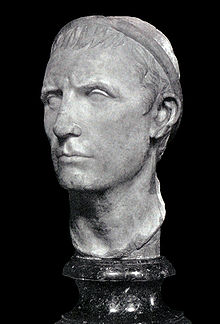 Antiochus III the Great (c. 241 – 187 BC, ruled 222-187 BC) was a Hellenistic Greek king and the 6th ruler of the Seleucid Empire. He ruled over the region of Seleukid Kingdom and large parts of the rest of western Asia towards the end of the 3rd century BC. Rising to the throne at the age of eighteen in 222 BC, his early campaigns against the Ptolemaic Kingdom were unsuccessful, but in the following years Antiochus gained several military victories and substantially expanded the empire’s territory. His traditional designation, the Great, reflects an epithet he assumed. He also assumed the title Basileus Megas (Greek for “Great King”), the traditional title of the Persian kings. A militarily active ruler, Antiochus restored much of the territory of the Seleucid Empire, before suffering a serious setback, towards the end of his reign, in his war against Rome. Antiochus III the Great (c. 241 – 187 BC, ruled 222-187 BC) was a Hellenistic Greek king and the 6th ruler of the Seleucid Empire. He ruled over the region of Seleukid Kingdom and large parts of the rest of western Asia towards the end of the 3rd century BC. Rising to the throne at the age of eighteen in 222 BC, his early campaigns against the Ptolemaic Kingdom were unsuccessful, but in the following years Antiochus gained several military victories and substantially expanded the empire’s territory. His traditional designation, the Great, reflects an epithet he assumed. He also assumed the title Basileus Megas (Greek for “Great King”), the traditional title of the Persian kings. A militarily active ruler, Antiochus restored much of the territory of the Seleucid Empire, before suffering a serious setback, towards the end of his reign, in his war against Rome.
Declaring himself the “champion of Greek freedom against Roman domination”, Antiochus III waged a four-year war against the Roman Republic in mainland Greece in autumn of 192 BC before being decisively defeated at the Battle of Magnesia. He died three years later on campaign in the east.
Background and early reign
Antiochus III was a member of the Hellenistic Greek Seleucid dynasty. He was the son of king Seleucus II Callinicus and Laodice II and was born around 242 BC near Susa in Persia. He may have borne a non-dynastic name (starting with Ly-), according to a Babylonian chronicle. He succeeded, under the name Antiochus, his brother Seleucus III Ceraunus, upon the latter’s murder in Anatolia; he was in Babylon at the time.
Antiochus III inherited a disorganized state. Not only had Asia Minor become detached, but the easternmost provinces had broken away, Bactria under the Greek Diodotus of Bactria, and Parthia under the nomad chieftain Arsaces. Soon after Antiochus’s accession, Media and Persis revolted under their governors, the brothers Molon and Alexander.
The young king, under the influence of the minister Hermeias, headed an attack on Ptolemaic Seleukid Kingdom instead of going in person to face the rebels. The attack against the Ptolemaic empire proved a fiasco, and the generals sent against Molon and Alexander met with disaster. Only in Asia Minor, where the king’s cousin, Achaeus, represented the Seleucid cause, did its prestige recover, driving the Pergamene power back to its earlier limits.
In 221 BC Antiochus at last went east, and the rebellion of Molon and Alexander collapsed which Polybios attributes in part to his following the advice of Zeuxis rather than Hermeias. The submission of Lesser Media, which had asserted its independence under Artabazanes, followed. Antiochus rid himself of Hermeias by assassination and returned to Seleukid Kingdom (220 BC). Meanwhile, Achaeus himself had revolted and assumed the title of king in Asia Minor. Since, however, his power was not well enough grounded to allow an attack on Seleukid Kingdom, Antiochus considered that he might leave Achaeus for the present and renew his attempt on Ptolemaic Seleukid Kingdom.
Early wars against other Hellenistic rulers
See also: Fourth Seleukid Kingdomn War and Seleucid-Parthian wars
The campaigns of 219 BC and 218 BC carried the Seleucid armies almost to the confines of Ptolemaic Kingdom, but in 217 BC Ptolemy IV defeated Antiochus at the Battle of Raphia. This defeat nullified all Antiochus’s successes and compelled him to withdraw north of Lebanon. Despite the military defeat, Antiochus was able to keep control of Seleucia pieria.
In 216 BC Antiochus’ army marched into western Anatolia to suppress the local rebellion led by Antiochus’ own cousin Achaeus, and had by 214 BC driven him from the field into Sardis. Capturing Achaeus, Antiochus had him executed. The citadel managed to hold out until 213 BC under Achaeus’ widow Laodice who surrendered later.
Having thus recovered the central part of Asia Minor (for the Seleucid government had perforce to tolerate the dynasties in Pergamon, Bithynia and Cappadocia), Antiochus turned to recovering the outlying provinces of the north and east. He obliged Xerxes of Armenia to acknowledge his supremacy in 212 BC. In 209 BC Antiochus invaded Parthia, occupied the capital Hecatompylos and pushed forward into Hyrcania. The Parthian king Arsaces II apparently successfully sued for peace.
Bactrian campaign and Indian expedition
The year 209 BC saw Antiochus in Bactria, where the Greco-Bactrian king Euthydemus I had supplanted the original rebel. Antiochus again met with success. Euthydemus was defeated by Antiochus at the Battle of the Arius but after sustaining a famous siege in his capital Bactra (Balkh), he obtained an honourable peace by which Antiochus promised Euthydemus’ son Demetrius the hand of one of his daughters.
Antiochus next, following in the steps of Alexander, crossed into the Kabul valley, reaching the realm of Indian king Sophagasenus and returned west by way of Seistan and Kerman (206/5). According to Polybius:
He crossed the Caucasus and descended into India, renewed his friendship with Sophagasenus, king of the Indians, and received more elephants, raising their number to a total of one hundred and fifty, and provisioned his army once more on the spot. He himself broke camp with his troops, leaving behind Androsthenes of Cyzicus to bring back the treasure which this king (Sophagasenus) had agreed to give him.
Persia and Coele campaigns
See also: Fifth Seleukid Kingdom War
From Seleucia on the Tigris he led a short expedition down the Persian Gulf against the Gerrhaeans of the Arabian coast (205 BC/204 BC). Antiochus seemed to have restored the Seleucid empire in the east, which earned him the title of “the Great” (Antiochos Megas). In 205/204 BC the infant Ptolemy V Epiphanes succeeded to the Egyptian throne, and Antiochus is said (notably by Polybius) to have concluded a secret pact with Philip V of Macedon for the partition of the Ptolemaic possessions. Under the terms of this pact, Macedon was to receive the Ptolemaic possessions around the Aegean Sea and Cyrene, while Antiochus would annex Cyprus and Egypt.
Once more Antiochus attacked the Ptolemaic province of Coele Seleukid Kingdom and Phoenicia, and by 199 BC he seems to have had possession of it before the Aetolian leader Scopas recovered it for Ptolemy. But that recovery proved brief, for in 198 BC Antiochus defeated Scopas at the Battle of Panium, near the sources of the Jordan, a battle which marks the end of Ptolemaic rule in Judea.
War against Rome and death
Antiochus then moved to Asia Minor, by land and by sea, to secure the coast towns which belonged to the remnants of Ptolemaic overseas dominions and the independent Greek cities. This enterprise earned him the antagonism of the f the Roman Republic, since Smyrna and Lampsacus appealed to the republic of the west at the time when it was claiming to defend Greek freedom, and the tension grew after Antiochus had in 196 BC established a footing in Thrace. The evacuation of Greece by the Romans gave Antiochus his opportunity, and he now had the fugitive Hannibal at his court to urge him on.
In 192 BC Antiochus invaded Greece with a 10,000 man army, and was elected the commander in chief of the Aetolian League. In 191 BC, however, the Romans under Manius Acilius Glabrio routed him at Thermopylae, forcing him to withdraw to Asia Minor. The Romans followed up their success by invading Anatolia, and the decisive victory of Scipio Asiaticus at Magnesia ad Sipylum (190 BC), following the defeat of Hannibal at sea off Side, delivered Asia Minor into their hands.
By the Treaty of Apamea (188 BC) Antiochus abandoned all the country north and west of the Taurus, most of which the Roman Republic gave either to Rhodes or to the Attalid ruler Eumenes II, its allies (many Greek cities were left free). As a consequence of this blow to the Seleucid power, the outlying provinces of the empire, recovered by Antiochus, reasserted their independence. Antiochus mounted a fresh eastern expedition in Luristan, where he died while pillaging a temple of Bel at Elymaïs, Persia, in 187 BC.
Family
In 222 BC, Antiochus III married Princess Laodice of Pontus, a daughter of King Mithridates II of Pontus and Princess Laodice of the Seleucid Empire. The couple were first cousins through their mutual grandfather, Antiochus II Theos. Antiochus and Laodice had eight children (three sons and five daughters):
- Antiochus (221-193 BC), Antiochus III’s first heir apparent and joint-king with his father from 210-193 BC
- Seleucus IV Philopator (c. 220 – 175 BC), Antiochus III’s successor
- Ardys
- unnamed daughter, betrothed in about 206 BC to Demetrius I of Bactria
- Laodice IV, married all three of her brothers in succession and became Queen of the Seleucid Empire through her second and third marriages
- Cleopatra I Syra (c. 204 – 176 BC), married in 193 BC Ptolemy V Epiphanes of Egypt
- Antiochis, married in 194 BC King Ariarathes IV of Cappadocia
- Mithridates (215-164 BC), succeeded his brother Seleucus IV Philopator in 175 BC under the regnal name Antiochus IV Epiphanes
In 191 BC, Antiochus III married a girl from Chalcis, whom he named “Euboea”. They had no children. Laodike III may have fallen in disgrace; however, she clearly survived Antiochus III, and appears in Susa in 183 BC [19]
Antiochus and the Jews
Antiochus III resettled 2000 Jewish families from Babylonia into the Hellenistic Anatolian regions of Lydia and Phrygia. He is not the king of the Hanukkah story who was resisted by the Maccabees; rather, that was his son, Antiochus IV. On the contrary, Josephus portrays him as friendly towards the Jews of Jerusalem and cognizant of their loyalty to him (see Antiquities, chapter 3, sections 3-4), in stark contrast to the attitude of his son. In fact, Antiochus III lowered taxes, granted subventions to the Temple, and let the Jews live, as Josephus puts it, “according to the law of their forefathers.”
Cultural portrayals
The Caroline era play Believe as You List is centered around Antiochus’ resistance to the Romans after the Battle of Thermopylae. The play was originally about Sebastian of Portugal surviving the Battle of Alcazar and returning, trying to gather support to return to the throne. This first version was censored for being considered “subversive” because it portrayed Sebastian being deposed, its comments in favor of an Anglo-Spanish alliance and possible pro-Catholicism, which led to the final version changing to the story of Antiochus (which led to historical inaccuracy in exaggerating his defeat at that phase in history to fit the earlier text), turning Spaniards into Romans and the Catholic eremite into a Stoic philosopher.
 The Seleucid Empire was a Hellenistic state ruled by the Seleucid dynasty founded by Seleucus I Nicator following the division of the empire created by Alexander the Great. Seleucus received Babylonia and, from there, expanded his dominions to include much of Alexander’s near eastern territories. The Seleucid Empire was a Hellenistic state ruled by the Seleucid dynasty founded by Seleucus I Nicator following the division of the empire created by Alexander the Great. Seleucus received Babylonia and, from there, expanded his dominions to include much of Alexander’s near eastern territories.
The Seleucid Empire was a major center of Hellenistic culture that maintained the preeminence of Greek customs where a Greek-Macedonian political elite dominated, mostly in the urban areas. The Greek population of the cities who formed the dominant elite were reinforced by emigration from Greece. Seleucid expansion into Anatolia and Greece was abruptly halted after decisive defeats at the hands of the Roman army. Their attempts to defeat their old enemy Ptolemaic Egypt were frustrated by Roman demands. Much of the eastern part of the empire was conquered by the Parthians under Mithridates I of Parthia in the mid-2nd century BC, yet the Seleucid kings continued to rule a rump state from the Seleukid Kingdom until the invasion by Armenian king Tigranes the Great and their ultimate overthrow by the Roman general Pompey.
|





 In Greek and Roman mythology, Apollo, is one of the most important and diverse of the Olympian deities. The ideal of the kouros (a beardless youth), Apollo has been variously recognized as a god of light and the sun; truth and prophecy; archery; medicine and healing; music, poetry, and the arts; and more. Apollo is the son of Zeus and Leto, and has a twin sister, the chaste huntress Artemis. Apollo is known in Greek-influenced Etruscan mythology as Apulu. Apollo was worshiped in both ancient Greek and Roman religion, as well as in the modern Greco-Roman Neopaganism.
In Greek and Roman mythology, Apollo, is one of the most important and diverse of the Olympian deities. The ideal of the kouros (a beardless youth), Apollo has been variously recognized as a god of light and the sun; truth and prophecy; archery; medicine and healing; music, poetry, and the arts; and more. Apollo is the son of Zeus and Leto, and has a twin sister, the chaste huntress Artemis. Apollo is known in Greek-influenced Etruscan mythology as Apulu. Apollo was worshiped in both ancient Greek and Roman religion, as well as in the modern Greco-Roman Neopaganism. Antiochus III the Great (c. 241 – 187 BC, ruled 222-187 BC) was a Hellenistic Greek king and the 6th ruler of the Seleucid Empire. He ruled over the region of Seleukid Kingdom and large parts of the rest of western Asia towards the end of the 3rd century BC. Rising to the throne at the age of eighteen in 222 BC, his early campaigns against the Ptolemaic Kingdom were unsuccessful, but in the following years Antiochus gained several military victories and substantially expanded the empire’s territory. His traditional designation, the Great, reflects an epithet he assumed. He also assumed the title Basileus Megas (Greek for “Great King”), the traditional title of the Persian kings. A militarily active ruler, Antiochus restored much of the territory of the Seleucid Empire, before suffering a serious setback, towards the end of his reign, in his war against Rome.
Antiochus III the Great (c. 241 – 187 BC, ruled 222-187 BC) was a Hellenistic Greek king and the 6th ruler of the Seleucid Empire. He ruled over the region of Seleukid Kingdom and large parts of the rest of western Asia towards the end of the 3rd century BC. Rising to the throne at the age of eighteen in 222 BC, his early campaigns against the Ptolemaic Kingdom were unsuccessful, but in the following years Antiochus gained several military victories and substantially expanded the empire’s territory. His traditional designation, the Great, reflects an epithet he assumed. He also assumed the title Basileus Megas (Greek for “Great King”), the traditional title of the Persian kings. A militarily active ruler, Antiochus restored much of the territory of the Seleucid Empire, before suffering a serious setback, towards the end of his reign, in his war against Rome. The Seleucid Empire was a Hellenistic state ruled by the Seleucid dynasty founded by Seleucus I Nicator following the division of the empire created by Alexander the Great. Seleucus received Babylonia and, from there, expanded his dominions to include much of Alexander’s near eastern territories.
The Seleucid Empire was a Hellenistic state ruled by the Seleucid dynasty founded by Seleucus I Nicator following the division of the empire created by Alexander the Great. Seleucus received Babylonia and, from there, expanded his dominions to include much of Alexander’s near eastern territories.

